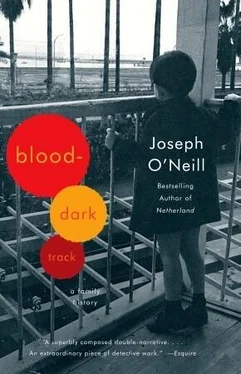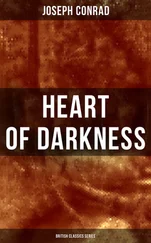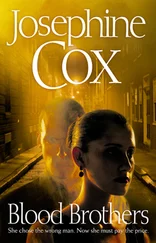This is a quiet and peaceful village, interested in fishing and tourism, both in the 1930s and today, with a sea-going tradition like all the coast of West Cork.
Although slightly puzzled by this last remark, which seemed to veer off the point, I put her reaction, and that of Christopher Somerville, down to a perfectly natural reluctance to re-open a painful and long-gone episode. And as the summer of 1997 wore on, a sudden flow of events in Ireland led me to wonder whether the rights and wrongs of a night in 1936 were not, as Mrs Salter-Townshend had said, simply water under the bridge. On 20 July 1997, the IRA declared a new ceasefire and entered into negotiations for a new political dispensation. The negotiations, mediated by the former United States senator George Mitchell, dragged on for months against a backdrop of sectarian killings of Catholics, bombings carried out by furiously disaffected republicans, and gruesome IRA ‘punishment shootings’ of suspected drug-dealers and other unpopular elements of the nationalist community. But on Good Friday, 10 April 1998, the parties signed an accord that provided, in effect, for the creation of a Northern Irish assembly; a cross-border ministerial council linking Belfast and Dublin on issues of mutual interest, such as tourism and agriculture; the abandonment of the Republic of Ireland constitutional claim to the Six Counties; an amnesty for all political prisoners; and the use by all parties of ‘any influence they may have’ to persuade paramilitary groups to disarm by June 2000. Like almost everybody else, I was jubilant. The Good Friday Agreement addressed (though of course did not fully meet) the central grievance of northern nationalists by giving Dublin a say in the government of their affairs, yet did so without diminishing the unionist capacity for self-government. The Agreement did not end the dispute as to the proper government of all Ireland, but it did promise to limit the dispute to the non-violent realm of constitutional politics; in other words, it promised peace. In May 1998, island-wide referendums resulted in 94.5 per cent of voters in the Republic and 71.1 per cent in Northern Ireland approving the measures proposed by the Good Friday Agreement. Even Grandma voted Yes. ‘My head said no, but my heart said yes,’ she told me on the phone with a slightly apologetic laugh.
I was very happy for my grandmother, glad that she could take pleasure in the thought that her years of political effort had reached a fruitful conclusion. It had required an ideological leap on her part to launch her into the political mainstream, a leap which, moreover, took her further away from her late husband. Jim O’Neill, said everyone whose views I canvassed, would have voted No. He would have regarded the Agreement as having set at naught a lifetime of republican toil.
I couldn’t really understand this viewpoint, because it seemed obvious to me that republican violence had achieved all that it was ever going to achieve. That said, it was also now obvious to me that the violence had, in fact, been efficacious. The inter-party negotiations, during which the Ulster Unionist leader, David Trimble, experienced the greatest difficulty in persuading his party members to accept the slightest measure of political change, had clarified that it was only the prospect of a return to war of the last thirty years that had spurred London to act and persevere and induced unionists to loosen their supremacist attachment to the Northern Irish status quo. The modern IRA campaign therefore passed Yitzhak Shamir’s test for the validity of an act of lethal political violence: it changed the course of history. Shamir’s extremely consequentialist test was obviously flawed as an ethical proposition, because it sanctioned the use of any effective means for any purpose. But if the 3,200 killings in the recent Troubles — up to two-thirds of which had been by republicans — had brought about a substantial amelioration in the lot of nationalists that would not otherwise have been achieved, suddenly it became very difficult for me to affirm that the price of change had been excessive — even if I felt that the principle merit of the Agreement may have been to bring to an end the very violence that had produced it. This line of thought led to another: if the apparently fruitless IRA activities of old had, by keeping the battered vehicle of republicanism on the road, substantially contributed to the IRA’s modern campaign, could those activities also be said, in retrospect, to have served a positive purpose? If yes, could the same be said about the Somerville killing, which jump-started the republican motor in 1936?
A justification of this kind entailed rationalizing the assassination as a form of notice . The purpose of such violence was not to bring about direct or immediate change or to make a measurable military gain but, rather, to alert the world to the existence of a wrongful political injury — in this case, the continuing trespass of the English in the north of Ireland — with a view to preserving, and enabling the eventual enforcement of, the rights of the injured party. Just as, in an ordinary case of trespass, signs of continuing ownership were required to defeat the claim of a long-term trespasser, so the title of the Irish nation in the land occupied by the English, if it was not to fall by the wayside, had to be asserted. More basically, after years of republican inactivity, a national revival of the IRA and its cause was required in 1936. Simply warning Admiral Somerville to stop helping would-be recruits to the Royal Navy would not have accomplished this; shooting him undoubtedly did. The fact that the Admiral had not been warned, and therefore might be said not to have ‘deserved’ his fate, was in this context (rather than in the context of a just war) an ethical irrelevance. It was not necessary to identify a ‘deserving’ target of violence, because in many ways the less deserving and more shocking the target, the greater the notice that would be taken of the existence and seriousness of the injury complained of and, as a consequence, the less gratuitous — and the more effective and morally coherent — would be the act of violence. Violence of this kind also gave rise to this assessment of the killers: that, in their readiness to assume the guilt and risks that came with the killing, they were to be applauded for assuming a moral burden on behalf of society; for, as the Good Friday Agreement illustrated, it was a well-recognized phenomenon that the apparently pacific majority in Ireland furtively but gratefully adopted the outcomes produced by the violent actions of republicans.
Having constructed this cold-hearted polemic, I recoiled from it. Although its final proposition rang true, taken as a whole it was clearly specious, not least because it appeared to sanction, say, the massacre of a classroom of schoolchildren as a mechanism of political complaint; and every moral intuition I possessed told me that was surely wrong. In any event, the polemic was a red herring: for Admiral Somerville was almost certainly killed by people who thought he deserved to die. What I still didn’t fully understand was why they thought this — or why they thought that killing him would be politically productive.
However, to return to Mrs Salter-Townshend’s point, did any of this matter any more? A palpable change in the political culture in Ireland suggested that it did not. Irish nationalism had entered a phase in which even the republican wing of the movement increasingly recognized the distinction between improving the lot of northern nationalists and unifying the island. It was more noticeable than ever that, with the progress of the peace process — i.e., the 1994 and 1997 ceasefires, the IRA’s agreement to the ‘Mitchell principles’ of non-violence, the all-party talks, and finally the Good Friday agreement — people in the Republic felt increasingly able to take an interest in the bloodshed of Irish history as a kind of entertainment, and anguished and bitter scrutiny of this or that unpleasant incident suddenly seemed misplaced and old hat. As old tensions disappeared, I wondered if it wasn’t a hard reality of certain kinds of political change that, after a point, certain victims and injustices were best forgotten about; and if, perhaps, the healthiest thing might not simply be to let Admiral Somerville rest.
Читать дальше
Конец ознакомительного отрывка
Купить книгу












